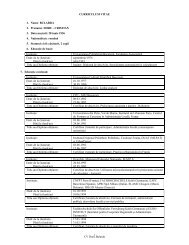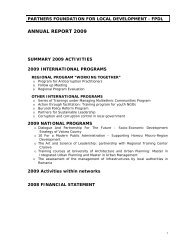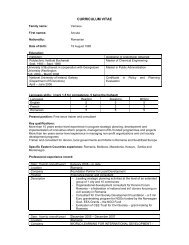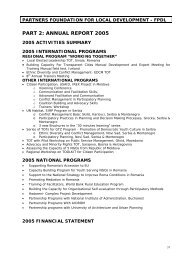Organizational Development: A Manual for Managers and ... - FPDL
Organizational Development: A Manual for Managers and ... - FPDL
Organizational Development: A Manual for Managers and ... - FPDL
Create successful ePaper yourself
Turn your PDF publications into a flip-book with our unique Google optimized e-Paper software.
Chapter 2.6 Training <strong>for</strong> <strong>Organizational</strong> <strong>Development</strong><br />
Responsibility of consultant <strong>and</strong> trainer<br />
<strong>Organizational</strong> development is the life of some <strong>and</strong> just a business <strong>for</strong> others. <strong>Managers</strong> do it,<br />
because they must do it. The place <strong>and</strong> time is determined. They have no choice. They are more<br />
or less qualified <strong>for</strong> such a job. However, they may need external assistance. In practice, they<br />
always need it, because manages are rarely in a position to organize <strong>and</strong> manage all kinds of<br />
human processes that must be initiated <strong>and</strong> conducted to achieve certain ends. When the needs<br />
are understood (or at least recognized as vague feelings), <strong>and</strong> managers see somebody who<br />
presumably may help – then the dem<strong>and</strong> arises <strong>and</strong> a great hunting season <strong>for</strong> consultants <strong>and</strong><br />
trainers results.<br />
The term ‘manager’ marks a certain kind of job, not a qualification grade. We have discussed the<br />
peculiarity of this job. Now we will agree on what we underst<strong>and</strong> about consulting <strong>and</strong> training as<br />
jobs. Let’s ask the ‘free encyclopaedia’ first:<br />
“Management consulting… refers to both the practice of helping companies to improve<br />
per<strong>for</strong>mance through analysis of existing business problems <strong>and</strong> development of future plans, as<br />
well as to the firms that specialize in this sort of consulting. …Management consultants generally<br />
bring <strong>for</strong>mal frameworks or methodologies to identify problems or suggest more effective or<br />
efficient ways of per<strong>for</strong>ming business tasks.<br />
Training refers to the acquisition of knowledge, skills, <strong>and</strong> attitudes as a result of the teaching of<br />
vocational or practical skills <strong>and</strong> knowledge that relates to specific useful skills.<br />
<strong>Organizational</strong> Training <strong>and</strong> <strong>Development</strong> is the field concerned with workplace learning to<br />
improve per<strong>for</strong>mance. Such training can be generally categorized as on-the-job or off-the-job. …<br />
An advantage of off-the-job training is that it allows people to get away from work <strong>and</strong> totally<br />
concentrate on the training being given. This is most effective <strong>for</strong> training attitudes, concepts, <strong>and</strong><br />
ideas.’ (www.en.wikipedia.org)<br />
Thus, the one who pretends to help organizations through analysis of existing problems <strong>and</strong><br />
development of future plans may be considered a consultant. Sometimes (especially when the<br />
attitudes, concepts <strong>and</strong> ideas of personnel must be addressed) the help may take the <strong>for</strong>m of<br />
designing <strong>and</strong> conducting training. Be<strong>for</strong>e this, somebody should help the provisional client<br />
underst<strong>and</strong> that training is needed.<br />
148
















